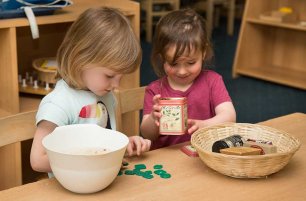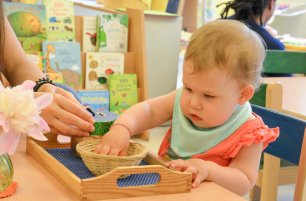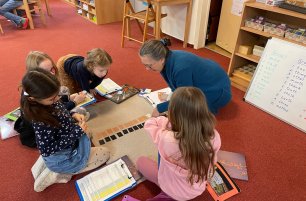Grace and Courtesy: Why is it so important?
Grace and Courtesy is a major part of the Practical Life curriculum from infancy through adolescence. You might overlook the Grace and Courtesy curriculum when you first visit a Montessori classroom; unlike Mathematics or Language, there usually isn’t a dedicated shelf or corner for it. However, it is nonetheless an essential part of the curriculum, with set lessons and goals; its „didactic materials“ are the teachers themselves, as well as the children’s community. Its aim is far more than simply teaching etiquette: it is to aid the self-construction of the child in their task to assume their full place in the human community.
Becoming Human
Dr. Montessori observed that children are keenly interested in social conduct and its rules; they quickly integrate and copy role models around them, often unconsciously. During the first six years, in the period of Absorbent Mind, these experiences are said to be incarnated: they become a part of the permanent foundation of the child’s self.
Most social rules and interactions must be learnt and are highly culture-specific. Think, for example, of the many varied behaviors that different cultures consider polite table manners. Now, imagine yourself “dropped” into a foreign culture and trying to navigate it, avoiding offense, without any previous preparation. Wow, it would be priceless to have an expert native guide!
All people are asked to do exactly that actually as children: hopefully with loving families and teachers for guides, we learn – some better, some less well – to act appropriately and function within our society.
The purpose of the Grace and Courtesy curriculum is to offer our children the best possible assistance on this path. Explaining and modeling clearly, we share the most harmonious ways of behaving, relating and communicating, and help children practice and master them. Step by step, from the simplest skills (like saying “excuse me” or shaking hands) children build a “vocabulary” of actions that allows them to act appropriately and feel confident in social settings.
Always learning
One of the key differences between Grace and Courtesy and, say, Mathematics, is that there are times when we as adults are not teaching math. As long as there is a child around us, however, we are always modeling how to be a human being; all we do is, on some level, processed and remembered by the child. And of course, actions always speak louder than words.
If we want the child to internalize kindness, respect and empathy, we must be kind, respectful and empathetic – always. Right, it’s that easy... It may be some relief to point out that when we make mistakes or mistreat others, at least this is the perfect opportunity to show and model other key social skills – a sincere apology and making amends.
What does Grace and Courtesy look like in practice? Read more here.
By Michaela Tučková, IMSP Toddler Teacher
Want to learn more? Read our next article:




